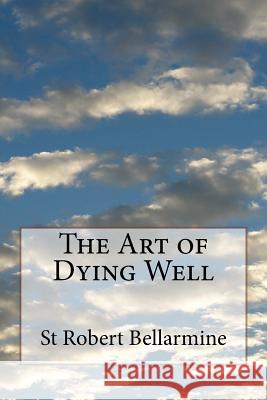The Art of Dying Well » książka
The Art of Dying Well
ISBN-13: 9781497459403 / Angielski / Miękka / 2014 / 96 str.
The Art of Dying Well
ISBN-13: 9781497459403 / Angielski / Miękka / 2014 / 96 str.
(netto: 49,63 VAT: 5%)
Najniższa cena z 30 dni: 52,11
ok. 16-18 dni roboczych.
Darmowa dostawa!
Excerpt: CHAPTER I. HE WHO DESIRES TO DIE WELL, MUST LIVE WELL I NOW commence the rules to be observed in the Art of dying well. This art I shall divide into two parts: in the first I shall speak of the precepts we must follow whilst in good health; in the other of those we should observe when we are dangerously ill, or near death's door. We shall first treat of those precepts that relate to virtue; and afterwards of those which relate to the sacraments: for, by these two we shall be especially enabled both to live well, and to die well. But the general rule, " that he who lives well, will die well," must be mentioned before all others: for since death is nothing more than the end of life, it is certain that all who live well to the end, die well; nor can he die ill, who hath never lived ill; as, on the other hand, he who hath never led a good life, cannot die a good death. The same thing is observable in many similar cases: for all that walk along the right path, are sure to arrive at the place of their destination; whilst, on the contrary, they who wander from it, will never arrive at their journey's end. They also who diligently apply to study, will soon become learned doctors; but they who do not, will be ignorant. But, perhaps, some one may mention, as an objection, the example of the good thief, who lived ill and yet died well. This was not the case; for that good thief led a holy life, and therefore died a holy death. But, even supposing he had spent the greater part of his days in wickedness, yet the other part of his life was spent so well, that he easily repented of his former sins, and gained the greatest graces. For, burning with the love of God, he openly defended our Saviour from the calumnies of His enemies; and filled with the same charity towards his neighbour, he rebuked and admonished his blaspheming companion, and endeavoured to convert him. He was yet alive when he thus addressed him, saying: "Neither dost thou fear God, seeing thou art under the same condemnation? And we indeed justly, for we receive the due reward of our deeds: but this man hath done no evil." (St. Luke 23:40, 41.) Neither was he dead when, confessing and calling upon Christ, he uttered these noble words: "Lord, remember me when thou shalt come into thy kingdom." The good thief then appeared to "have been one of those who came last into the vineyard, and yet he received a reward greater than the first." True, therefore, is the sentence, " He who lives well, dies well;" and, "He who lives ill, dies ill." We must acknowledge that it is a most dangerous thing to deter till death our conversion from sin to virtue: far more happy are they who begin to carry the yoke of the Lord "from their youth," as Jeremiah saith; and exceedingly blessed are those, "who were not defiled with women, and in whose mouth there was found no lie: for they are without spot before the throne of God. These were purchased from among men, the first-fruits to God and to the Lamb." (Apoc. 14:4, 5.) Such were Jeremias, and St. John, "more than a prophet;" and above all, the Mother of our Lord, as well as many more whom God alone knoweth. This first great truth now remains established, that a good death depends upon a good life.
Zawartość książki może nie spełniać oczekiwań – reklamacje nie obejmują treści, która mogła nie być redakcyjnie ani merytorycznie opracowana.











